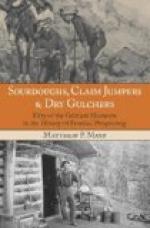She dropped her skirt, and stood up beside him with a pretty shake of the shoulders.
“Now let’s see it,” she begged.
She examined the weapon with much interest, throwing down and back the lever in a manner that showed she was accustomed at least to the old-style arm.
“How light it is!” she commented, squinting through the sights. “Doesn’t it kick awfully?”
“Not a bit. Smokeless powder, you know.”
“Of course. What’ll we shoot at?”
Bennington fumbled in his pockets and produced an envelope.
“How’s this?” he asked.
She seized it and ran like an antelope—with the same gliding motion—to a tree about thirty paces distant, on which she pinned the bit of paper. They shot. Bennington hit the paper every time. The girl missed it once. At this she looked a little vexed.
“You are either very rude or very sincere,” was her comment.
“You’re the best shot I ever saw——”
“Now don’t dare say ‘for a girl!’” she interrupted quickly. “What’s the prize?”
“Was this a match?”
“Of course it was, and I insist on paying up.”
Bennington considered.
“I think I would like to go to the top of the rock there, and see the pines, and the skull-stones, and the prairies.”
She glanced toward him, knitting her brows. “It is my very own,” she said doubtfully. “I’ve never let anybody go up there before.”
One of the diminutive chipmunks of the hills scampered out from a cleft in the rocks and perched on a moss-covered log, chattering eagerly and jerking his tail in the well-known manner of chipmunks.
“Oh, see! see!” she cried, all excitement in a moment. She seized the rifle, and taking careful aim, fired. The chattering ceased; the chipmunk disappeared.
Bennington ran to the log. Behind it lay the little animal. The long steel-jacketed bullet had just grazed the base of its brain. He picked it up gently in the palm of his hand and contemplated it.
It was such a diminutive beast, not as large as a good-sized rat, quite smaller than our own fence-corner chipmunks of the East. It’s little sides were daintily striped, its little whiskers were as perfect as those of the great squirrels in the timber bottom. In its pouches were the roots of pine cones. Bennington was not a sentimentalist, but the incident, against the background of the light-hearted day, seemed to him just a little pathetic. Something of the feeling showed in his eyes.
The girl, who had drawn near, looked from him to the dead chipmunk, and back again. Then she burst suddenly into tears.
“Oh, cruel, cruel!” she sobbed. “What did I do it for? What did you let me do it for?”
Her distress was so keen that the young man hastened to relieve it.




